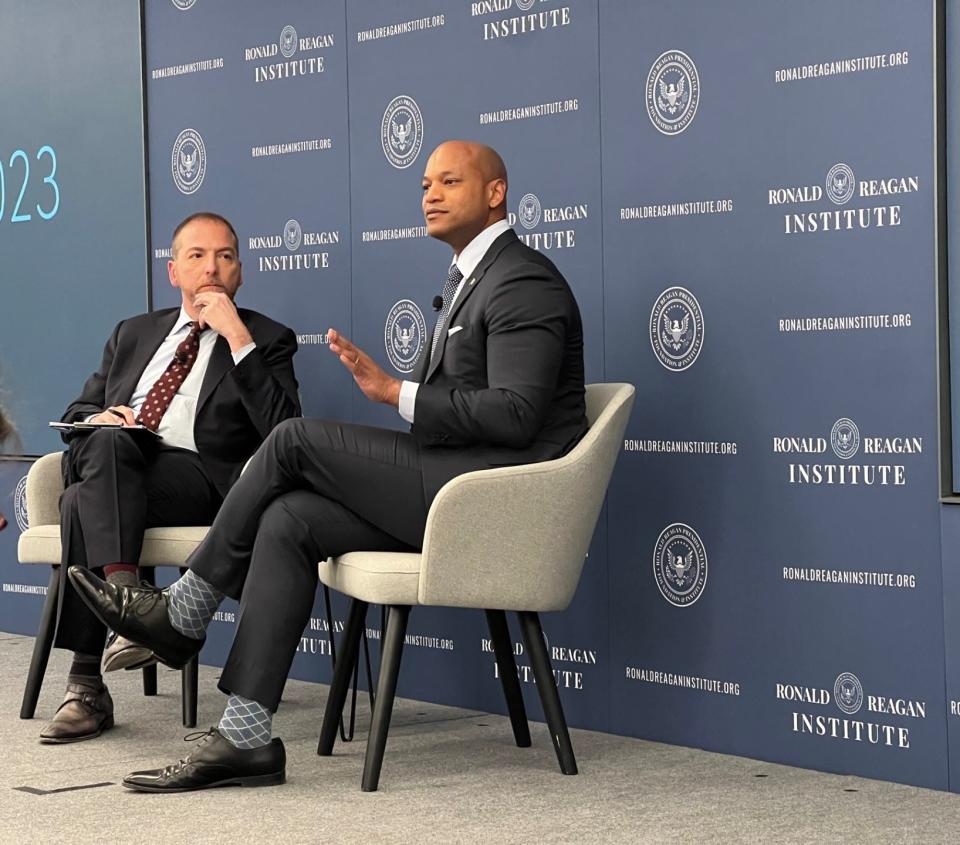Gov. Wes Moore seeks to change the equation on education, employment
- Oops!Something went wrong.Please try again later.
- Oops!Something went wrong.Please try again later.
While Washington dealmakers dueled over dollars and the debt, a former finance pro-turned-governor talked transforming education a few doors down from the White House on Thursday.
Maryland Gov. Wes Moore took to the stage at the Ronald Reagan Institute’s Summit on Education alongside Chuck Todd of NBC News for a conversation, which covered an array of topics from community schools to closing a skills gap between a pool of prospective employees and employers seeking talent.
Earlier in the day, former Maryland Republican Gov. Larry Hogan and first lady Jill Biden also gave remarks at the summit that took place at the institute on Black Lives Matter Plaza in D.C., located with street views of both the Washington Monument and the residence at 1600 Pennsylvania Ave. Presidential aspirant, former Arkansas Gov. Asa Hutchinson, a current Republican presidential candidate, preceded Moore on stage with Todd.

Both state chief executives repeated the refrain from a 1983 report released during the Reagan administration called: “A Nation At Risk: The Imperative For Educational Reform,” which Todd highlighted in his questioning to the governors.
“We’re still a nation at risk because we have not figured out a way of connecting the ends with the means,” Moore said. He pointed to a “participation gap” where people are unprepared for existing jobs due to the skills that are required for the positions that are available in the economy.
More: Wes Moore for president? Maryland governor fights hype to focus on state's business
In April, Maryland’s unemployment rate fell from 2.7% to 2.5%, a rate which Moore called “historically low.” The national rate dropped from 3.5% to 3.4% during that same period.
“Here’s the challenge,” said Moore, both the former CEO of an anti-poverty organization and a former Wall Street investment banker, “we still have two available jobs in the state for every single person filing for unemployment.”
The number unemployed stood at 78,803 in April, according to the state Department of Labor website. The U.S. Bureau of Labor Statistics website showed 165,000 job openings in the state as of March 2023.
“How does that make sense?” Moore said. “It’s a skills gap,” Todd and Moore both said, in quick succession. The Maryland governor then listed a handful of employers in the state.
“We are the home of NASA,” he said, referring to the space agency in Greenbelt. “We are the home of the Applied Physics Lab,” he said, referring to the Laurel-located, Johns Hopkins University-backed research center. “We are the home of U.S. Cyber Command.
More: Year In Review: Who were 2022's 10 biggest employers across Maryland?
“We have private sector employers and also government agencies who are screaming at us about the type of skill sets they’re looking for,” said the governor of five months, “but we do not have an education system that's listening.”
Todd then transitioned to a topic he talked about with Hutchinson: computer science education. Moore said the state is “doing better” in the subject based off a law, which expands courses.
Another thing Moore said he was open to expanding, when asked by Todd, is public charter schools. Schools being both public and effective were the two criteria for Moore’s support.
“What do you do with a failing school?” the Meet the Press host then said.
Moore said not enough time is spent identifying why schools work.
“The way we address the fact that we have these type of education gaps is not simply by saying we’re going to take the old framework and put more capital in to it,” he said. “How are we changing the entire framework?”
More: Board plotting Maryland's education future gets new member, but funding questions remain
For Moore, Todd’s question is no abstract topic. In a state with some of the top global science and research facilities, less than a quarter (22%) of third-through-eighth-grade students were proficient on the math section of the Maryland Comprehensive Assessment Program (MCAP), according to data from the Maryland State Department of Education released earlier this year.
Asked by USA TODAY Network in Maryland, after the conversation with Todd, how those scores could be improved, Moore pointed to several items, chief among them, starting schooling for the youngest students sooner.
“We've got to make sure that we’re starting earlier,” said the governor, alluding to an inauguration pledge he made to expand public education to include pre-kindergarten classes. He also called for “fixing the childcare system,” a system which has been shown to have desert areas in certain parts of the state and complements pre-kindergarten.
Moore said additional tutors and educators inside the classroom would help, reducing class sizes.
“If we can do those things,” he said, “we can make a significant dent on being able to hit those indicators in a better fashion.”
Dwight A. Weingarten is an investigative reporter, covering the Maryland State House and state issues. He can be reached at dweingarten@gannett.com or on Twitter at @DwightWeingart2.
This article originally appeared on The Herald-Mail: Forty years after ed. report, governors talk improving U.S. education

